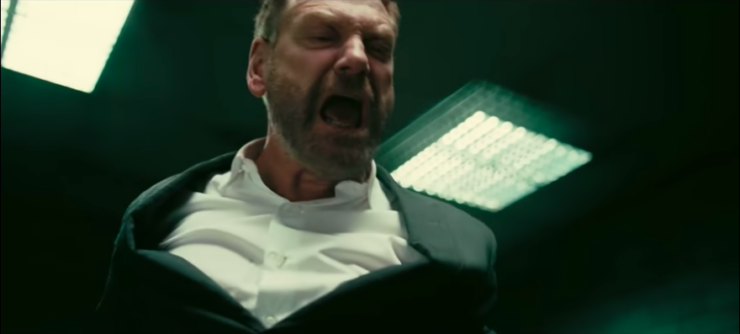Early on in Christopher Nolan’s Tenet, a character known only as the Protagonist (John David Washington) faces the end of his life on a set of train tracks. While his “resurrection” will be brought about by a pair of Russian thugs and a cyanide capsule, Nolan fans can’t help but hear Cobb and Mal from Inception whispering their dark lullaby: You’re waiting for a train. A train that’ll take you far away. You know where you hope this train will take you. But you can’t know for sure. Yet it doesn’t matter. Now, tell me why?
For the Protagonist, a CIA operative, it’s because he’s proven his loyalty enough to be erased from this life and ushered into a secretive cabal known only as Tenet, to prevent a war that hasn’t happened yet. But Nolan’s ambitious yet clunky palindromic spy thriller spends equal amounts of time looking forward as it does retracing steps backwards—including for the writer-director himself, who seems to have turned in his most self-referential film yet.
Minor spoilers for Tenet below.
There is, of course, Washington’s hero being dubbed as the “fresh-faced Protagonist” despite his seasoned status as an operative, brought in to this existential war not of time travel per se, but of weaponized entropy and time inversion. (And while he may believe himself the hero of his own story, that doesn’t mean the same is true on a global scale.) While the movie has all the trappings of a spy thriller—bungee-jumping into skyscrapers, epic explosions (and reverse explosions!), catamaran chases and yacht reckonings—it also has the feel of a fantasy story, of the audience proxy being slowly exposed to the hidden magic that shimmers in the corners of our ordinary world.

Here, that magic is bullets that snap out of bullet holes and back into empty cartridges, and assailants who fight as if they’re a video being rewound at hyper-speed. The casting of Clémence Poésy (Harry Potter’s Fleur Delacour) as Tenet’s expositional scientist seems a sly wink; her line of “You’re not here for what, you’re here for how” brings to mind Michael Caine explaining the titular three-part trick in The Prestige. (And we know how devastating an unexpected bullet is in that movie.)
Speaking of, there’s a Michael Caine cameo in which he looks just so amused to be here as yet another sage figure enjoying a lovely brunch while imparting wisdom—said wisdom primarily being, that if the Protagonist wants to get to various powerful men who might help or harm Tenet’s mission, he should try contacting their wives. Nolan, notorious for the dead-wife-as-hero’s-motivation trope, seems to be summoning that old adage: Behind every strong man is an even stronger woman. Of course, that only goes so far when Elizabeth Debicki’s art appraiser Kat, estranged wife of Russian oligarch Andrei Sator (Kenneth Branagh, chewing the scenery, spitting it out, then stuffing it back in for a second go) spends all of her time talking about her son who is hardly seen in the movie. But look, she doesn’t die! Nolan seems to be saying. It’s not much of a consolation.

I’m trying to avoid revealing too many plot specifics, because that is the treat of a Nolan film: gathering the pieces of his worldbuilding, then assembling them just in time to watch the machine render its visual and storytelling thrills. Tenet doesn’t really get going until basically the exact midpoint—and that must be by Nolan’s design, to spend the first half of the movie on atmosphere and the second on action. This structural palindrome boasts a stunning scene at the center that benefits from the at-home option of immediately rewinding, and that gets at the heart of what he spends the rest of the film (on both sides of that moment) trying to achieve. Once the narrative machine is in motion and the Protagonist is getting the hang of inversion himself, various fight scenes and set pieces tap into the same mind-boggling visual exhilaration of Inception’s hotel zero-g fight and snowy mountain fortress siege.
Hats off to Collider for keenly identifying that this is Nolan’s take on James Bond—especially with all the globe-trotting and Branagh screaming in a Russian accent on his yacht—but with his own twist that it’s Bond given the chance to reverse his actions and try for new outcomes. Like any good time travel story, it returns to prior moments to infuse them with new meaning; yet because Nolan has plotted it with fewer layers than usual beyond the time inversion, it’s easy for the audience to guess many of the “twists” given only a little bit of context.

Similarly, there’s a fascinating commentary on being just a cog in the machine—not even given a name, just a designation—and confronting a fiercely self-reliant character with supposed allies he just can’t trust. The standout performance is Robert Pattinson as Neil, a spy contact whose charisma carries him through every new bit of worldbuilding and expositional setup. Watching him try to bond with the Protagonist while the latter—for whom attachments are an occupational hazard—seems ready to suspect him of sabotage in every other scene reflects the movie’s push-and-pull clockwork. What soothes Inception‘s Mal on the tracks, not knowing where the train will take her, is her answer to Cobb’s quasi-riddle: Because you’ll be together. By contrast, the Protagonist would rather go it alone. Yet despite this suspicion, he readily follows orders without asking questions, seamlessly shifting his loyalty from the CIA to Tenet in a fascinating move that doesn’t get nearly enough exploration as it deserves.
The pieces are all there, but what’s disappointing is that the final result is just not as polished as one would expect Nolan’s Bond to be. The same goes for the technical aspects—while the more one-on-one scenes of car chases and corridor fights spectacularly put on display the tension between forward and inverted opponents, the larger set pieces make it a lot more difficult to parse who’s going which way in time. And despite Ludwig Göransson’s compelling countdown score, the sound editing swallows up most of the dialogue, so that when Branagh gets to his big speech it’s impossible to pick out anything but the buzz words.

If you’re a Nolan fan, you’ll no doubt find this an engaging puzzle to ponder past the credits. The benefit of its prior theatrical release is that there are plenty of subreddits that have already created timelines, diagrams, and one solid fan theory. However, if you’re hoping for Nolan to outdo himself, this isn’t the time.
Tenet is available now on VOD platforms to buy, and will be available to rent on January 5.
Natalie Zutter appreciated the ability to rewatch a key scene several times at home. Talk Nolan twists and other time “inversion” stories with her on Twitter!










